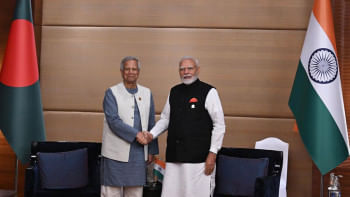The dicey digital security law

The government is moving forward in framing yet another law. This time purportedly "to check cybercrime and ensure digital security". While there is little scope to disagree that ever-changing nature of crimes committed in the cyber world calls for updating the existing laws, one is not too sure if a new law, in the format that has been proposed, is necessarily the right remedy.
A close reading of the proposed law unravels major problems in the text. In its stride to combat cyber crimes and ensure digital security, the draft law has all the elements to become an intrusive instrument in citizen's lives. It is loaded with vaguely defined terms and disproportionate punishment that impinge on freedom of expression of the populace without providing adequate procedural safeguards such as a competent appellate authority.
The number of offences listed in the law is inordinately high. More so, some of the offences are vaguely defined, such as use of electronic devices to "harm the country's stability and law and order", "hurt religious sentiments", "acts of defamation" or "carry out propaganda". No less worrisome is the text does not spell out clearly what actions would be considered as "propaganda and publicity" against the War of Liberation, the father of the nation and the friendly states. Elementary knowledge in jurisprudence informs that a law must unambiguously define its parameters. Otherwise, there always remains scope for its misapplication. In his reaction to the proposed law, the former Awami League law minister, Shafique Ahmed, is on record stating that any law must clearly define what actions would be considered as offense.
The proposed law provides for imposition of harsh sentences including lengthy terms of imprisonment. It imposes life imprisonment or a fine of Tk. 1 crore for 'spreading propaganda' against "Bangladesh's war of liberation, or spirit of liberation, or court settled issues related to liberation war or against the father of the nation". The punishment would be the same for anyone patronising the offender. The law also provides a maximum penalty of 14 years and a minimum of two years in prison and also a fine of up to Tk. 1 crore or both for 'cyber terrorism'. Actions that "may affect Bangladesh's unity" and "hinder other countries' security" or "help and encourage someone to commit terrorist activities" would be considered as cyber-terrorism. "For creating enmity and causing deterioration of law and order", a person could face a maximum penalty of seven years and a minimum of one year in jail and Tk. 7 lakh fine or both. The law further stipulates that "if anyone commits crimes using a computer, a mobile or any digital device", the person would face a maximum punishment of five years and a minimum of two years in jail or Tk. 3 lakh fine or both.
While globally cybercrimes are usually considered as civil offence, the proposed law deems them criminal. The sanctions proposed are disproportionately severe than the offences. In addition of being vague, most offences listed do not flow from criminal liability of "dishonest intent" or "serious harm".
The law confers wide authority to the low ranking law enforcement officials without appropriate judicial oversight. It also accords discretionary authority to the decision-makers. Provisions of bypassing the court to conduct search and seizure operations will have serious implications on privacy rights of the citizens. The law not only stipulates individuals and service providers to furnish records and access to systems but ominously to "assist". Such calling up for assistance could be interpreted "to mean almost anything". It is noteworthy that this new Act incorporates the grossly abused Sections 54 to 57 of the ICT Act.
The law provides for setting up of a Digital Security Agency headed by a Director General (DG). The DG will enjoy the power to direct any law enforcement agency to stop broadcast of information through electronic devices. If necessary, the DG can order an immediate stop to any transmission. The proposal to establish this body will create the scope to undermine the authority of the Bangladesh Telecommunication Regulatory Commission. It is interesting to note that powers that are usually vested in the Court in any democratic polity have been passed on to the DG. Although imposition of fine is a judicial act, that function has been placed also on the DG.
Rights activists have expressed serious concern that the proposed law does not have enough procedural safeguards for human rights protection. Nor does it make any reference to Bangladesh's obligation to international human rights instruments. "Such absence threatens the entire proposed Act's compatibility with international standards", they note. The proposed law will have adverse impact on the freedom of expression; particularly press freedom, as it offers no protection of sources of journalistic materials.
Advances in information technology have led to new forms of censorship, including online censorship that are directed to weaken citizens' ability to "hold opinions or seek, receive and impart information and ideas". This half-hearted effort to extend penal codes to the online world has spawned a condition to criminalise the standard practices of online journalists. The proposed law bears all the hallmarks of laws that give undue discretionary authority to officials that undermine critical reporting, posting opinions in social media, encouraging debate and flow of information in the name of counter-terrorism, protecting public order, and individual or country's image.
There is a strong case to suggest that instead of framing a separate law, the authentic concerns of the government on cyber security can be addressed under existing laws including those of CrPC, ICT Act 2006, Pornography Act-2012 and the Bangladesh Telecommunication Act-2001 (amended 2006). If need be, amendments of some provisions of those laws and that of Evidence Act could be effected.
If the government remains resolute in framing a separate law then it should pay heed to the prime ministerial directive at the Cabinet meeting of August 22 to make sure "there is no repetition, contradiction or inadequacy" in the new law and with other relevant laws. It will also be worthwhile to take note of the advice of the Committee to Protect Journalists, "to ensure any future version includes clearly defined press freedom and freedom of expression guarantees".
The writer teaches International Relations at the University of Dhaka. He writes and researches on migration and right issues.

 For all latest news, follow The Daily Star's Google News channel.
For all latest news, follow The Daily Star's Google News channel. 




Comments